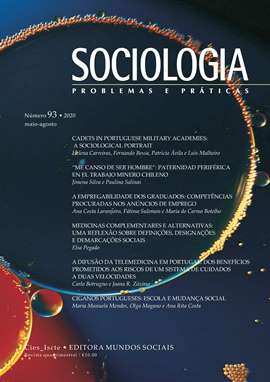The spread of telemedicine in Portugal: from the promised benefits to the risks of a two-speed healthcare system
DOI:
https://doi.org/10.7458/SPP20209312257Keywords:
telemedicine, telemonitoring, health information and communication technologies, online health, mobile health, health inequalitiesAbstract
This article’s primary goal is to analyse the policy for implementing telemedicine in the light of the possible repercussions its dissemination may have for both daily medical practice and, in more general terms, for the organisation of the Portuguese National Health Service (SNS). The authors base themselves on secondary data taken from regulations and reports published by the Ministry of Health and the European Commission, both specifically with regard to eHealth, and in relation to the broader subject of technological innovation in the health field. After assessing the main lines of the public strategy for promoting telemedicine, they highlight the desirability of a critical vision to accompany the spread of remote medical services, which is needed to avoid negative repercussions such as an increase in the trend towards the privatisation of health services and a worsening of inequalities, with the inherent danger of creating a “two-speed” healthcare system.
Downloads
Published
Issue
Section
License
Authors who publish in this Journal must agree the following terms and conditions:
- Authors retain copyright and grant the Journal the right to first publication, while simultaneously agreeing to a Creative Commons Attribution License, which allows others to share their work on condition that they cite the original author(s) and recognise that the latter’s work was first published in this Journal.
- Authors are authorised to enter into additional contracts separately, for non-exclusive distribution of the version of the work that is published in this Journal (e.g. publication in an institutional repository or as a book chapter), subject to recognition of initial publication in this Journal.



